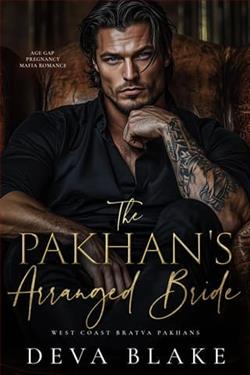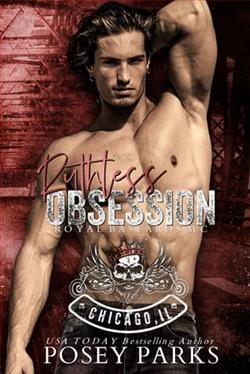Page 58 of Beneath the Indigo Sky
They’re black now.
Only black.
I can’t tear my eyes from his skin. I can’t look away from the wide swaths of lifeless black and the angry red scuffs left by asphalt and knuckles. I’ll never be able to forget the greens and purples and blues that mar the normally pale and pristine stretches of skin. I can’t look away from the hard white cast that encases his wrist and the tops of his long, elegant fingers or the bandages that obscure one of his cheeks and sections of his chest.
I hadn’t thought much of it when I’d heard the police siren rush past the shop yesterday evening. I’d been too absorbed in trying to finish changing a finicky serpentine belt before Namid was ready for us to head home to consider what trouble someone in town might be causing. Even a town this small has a few teens and unruly adults who take things too far once in a while. When the ambulance passed by moments later, I found myself wondering who in the world could be causing such a disturbance that they’d needed an ambulance at six at night. When the second and third police cars had rushed past, I’d paused my work and stepped outside to glance around. They weren’t at the bar. They were parked four blocks away, barricading the entrance to the grocery store parking lot. The grocery store where Namid was picking up the ingredients for supper.
I ran.
I’d arrived before they had a chance to call me, before they’d gotten him strapped onto the gurney or lifted him into the ambulance. I’d arrived to find the man I love lying on asphalt that is pale and greyed with age, save for the glistening strips of this year’s tar over new cracks and the streaks of blood that slowly spread from his all-too-still body. A young EMT, one I’d met a handful of times, knelt over Namid, his knees spread, hands cupping Namid’s temples to prevent any neck movement. I didn’t remember the EMT’s name, but he’d always been kind to me when he brought the ambulance in for oil changes and tire rotations. He’d been kind to Namid as well. He didn’t hold my gaze for long when he saw me arrive.
When I’d followed Namid to the ambulance without a word, the EMT had held out his hand to help me step into the back of the vehicle as soon as he’d settled in at Namid’s side. I was grateful for that.
Namid was still unconscious when we arrived at the hospital, and it was only moments before he was wheeled down a hallway and out of sight as a nurse I’d never met held my wrists and told me I couldn’t follow. I’d have to wait. Ken arrived to find me standing in front of a heavy, closed door, staring down a bleak white hallway through the small, wire mesh-embedded window. He’d led me to the small cluster of chairs next to an old oak coffee table that held sticky magazines and a box of tissues, and we waited.
Namid had woken up in a panic just before they’d started a CT scan to check for head trauma. They’d sedated him after that. Ken and I were grateful for that, too. We had to beg them to keep him sedated, telling them that he suffered from anxiety and panic attacks so severe that he’d surely wake in the same state he had the first time if they didn’t listen to us. It was close enough to the truth.
They told us he’d been lucky. The men had broken several of his ribs and one of his wrists. They’d used their fists and knees and boots. He was cut and scraped and bruised and bloody, but there was no internal bleeding, no head injury, nothing that would take him from us. We stayed in the hospital until the following evening while they gave him IV fluids, anti-inflammatories, and antibiotics. Then we’d signed him out against medical advice and brought him home. They could do no more for him than we could, and when he woke, he needed to feel safe.
They told us this morning that they’d caught the two men quickly. They told us that Shelly had been in the checkout line two people behind Namid and that she’d entered the parking lot only a few minutes after he had. They told us she’d saved his life. While there had been a handful of people around when Namid had walked across the parking lot, none of them had intervened when the two men blocked his way. None of them had spoken when his bags had fallen to the ground. None of them had helped when he’d cried out. Shelly had. She’d run toward them, yelling and threatening. They hadn’t expected her, and they’d run, leaving Namid bleeding on the pavement as Shelly tried to wake him and called 911.
The silence in my small bedroom is overwhelming after the endless chatter of nurses, continuous beeping of equipment, and muffled shuffling of feet through hallways that have filled the past thirty-six hours.
“Here, son.” Ken is at my side, holding out a mug that smells like soup. “You have to eat something. You won’t be any good to him when he wakes up if you don’t at least try to take care of yourself, too.”
I haven’t let go of Namid’s hand in hours, not since I laid him gently in my bed. He’d still been lightly sedated when we’d left the hospital, and we’d had to fight with everything we had to remove him before he woke. That was three hours ago. Three hours and twenty-two minutes. He should wake up soon. He will wake up soon.
“Thanks,” I mumble as I shift so that I’m only clinging to Namid with one hand, reaching for the mug with the other.
Ken settles into the second chair we’ve placed beside my bed, and I manage to tear my eyes from Namid to look at him. He looks as tired as I feel. For the first time since we’ve been spending time together, Ken looks old.
“Did I do this, Ken? Is this my fault?” I can barely hear my own whisper.
“How in the hell would this be your fault?” He sounds genuinely confused.
“I told him I didn’t want to hide. I kissed him at the shop. I told him we’d make this work.”
Ken shifts forward to rest his elbows on his knees with a sigh. “Namid would have asked you the same thing eventually, Jayce. He wouldn’t want to hide forever either.”
When I open my mouth to respond, Ken cuts me off.
“I know he’s a quiet man, and I know he’s been happy with me since he arrived, but the way he loves you…it’s the type of love not many people get to experience. He wouldn’t want to keep that secret for the rest of his life.”
“I could have lost him, Ken.”
“I know, but you didn’t.”
“But I…”
“You didn’t,” Ken cuts me off again. “You and I know what it’s like to lose people we love, but you can’t let fear control you. The two of you deserve to live the life you want. Together.”
I stare into the mug of quickly cooling soup for a long time before managing to find words that hopefully match what I’m feeling.
“When I lost Jordyn, I lost half of my soul.”
Clearing my throat does little to clear the harsh, gravelly tone from my voice.
“I thought I’d spend the rest of my life feeling like half of a person. I thought I’d move through the world, managing to eat and sleep and work, but that was all. I was alone. I had no family and no one to love. There was no one left who loved me. I didn’t expect to find love again. I didn’t really ever expect to live again. For as long as I can remember, my soul has never felt whole on its own, and when I lost Jordyn, the emptiness that was left simply became a part of me. It became who I was.”















